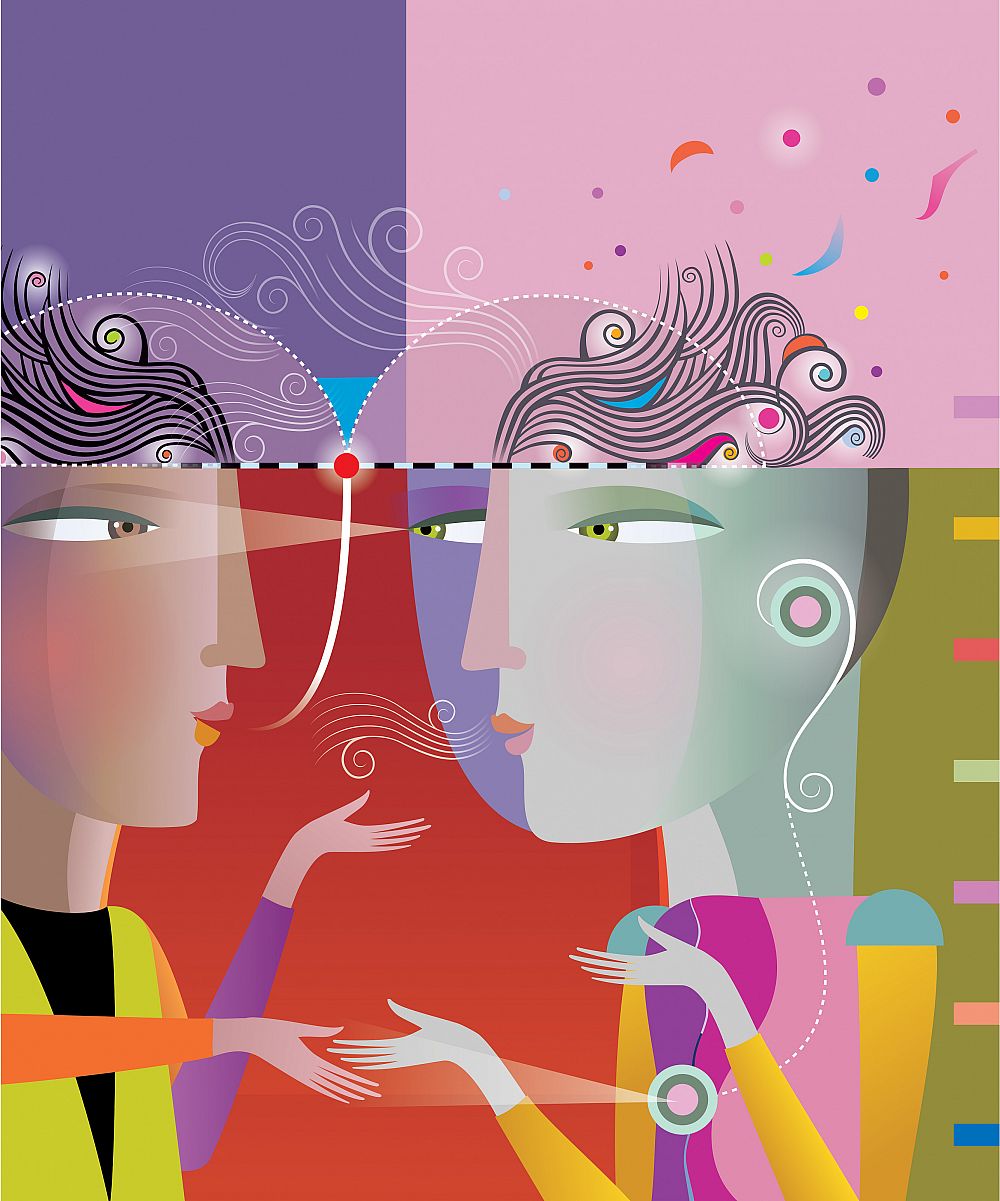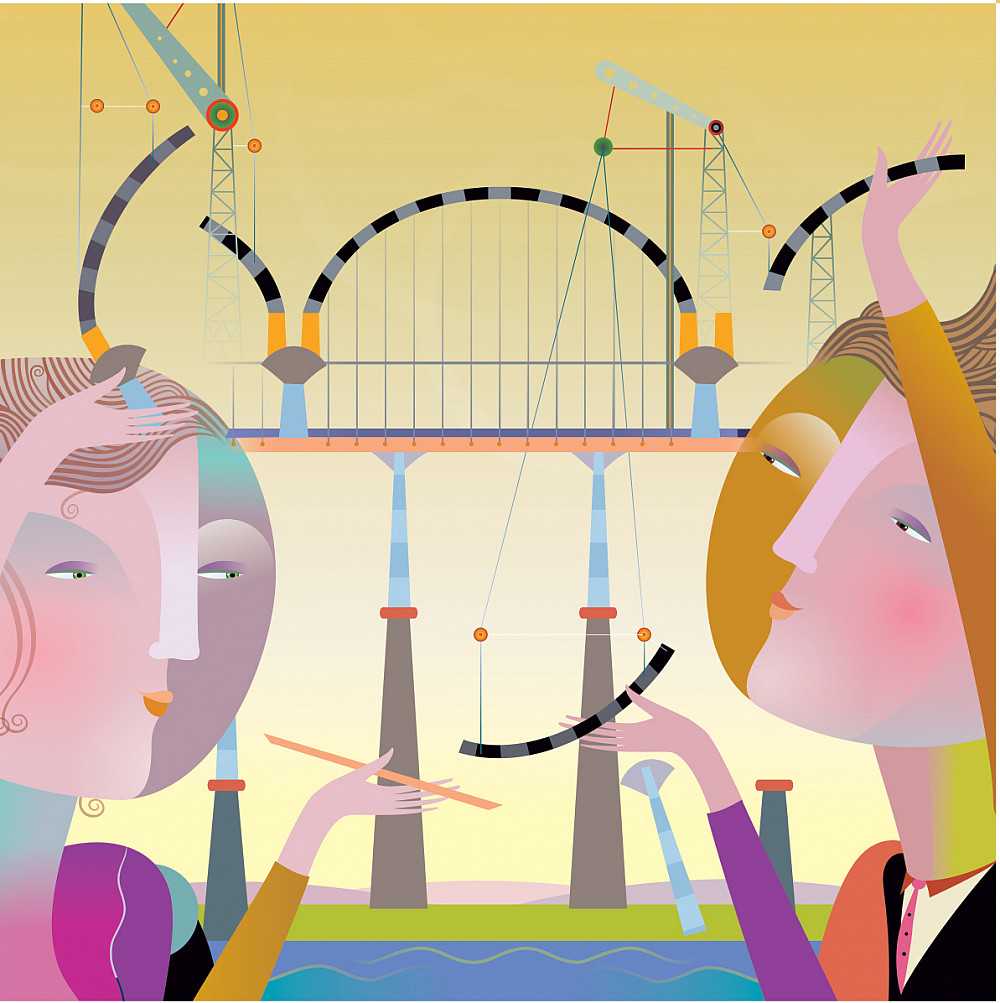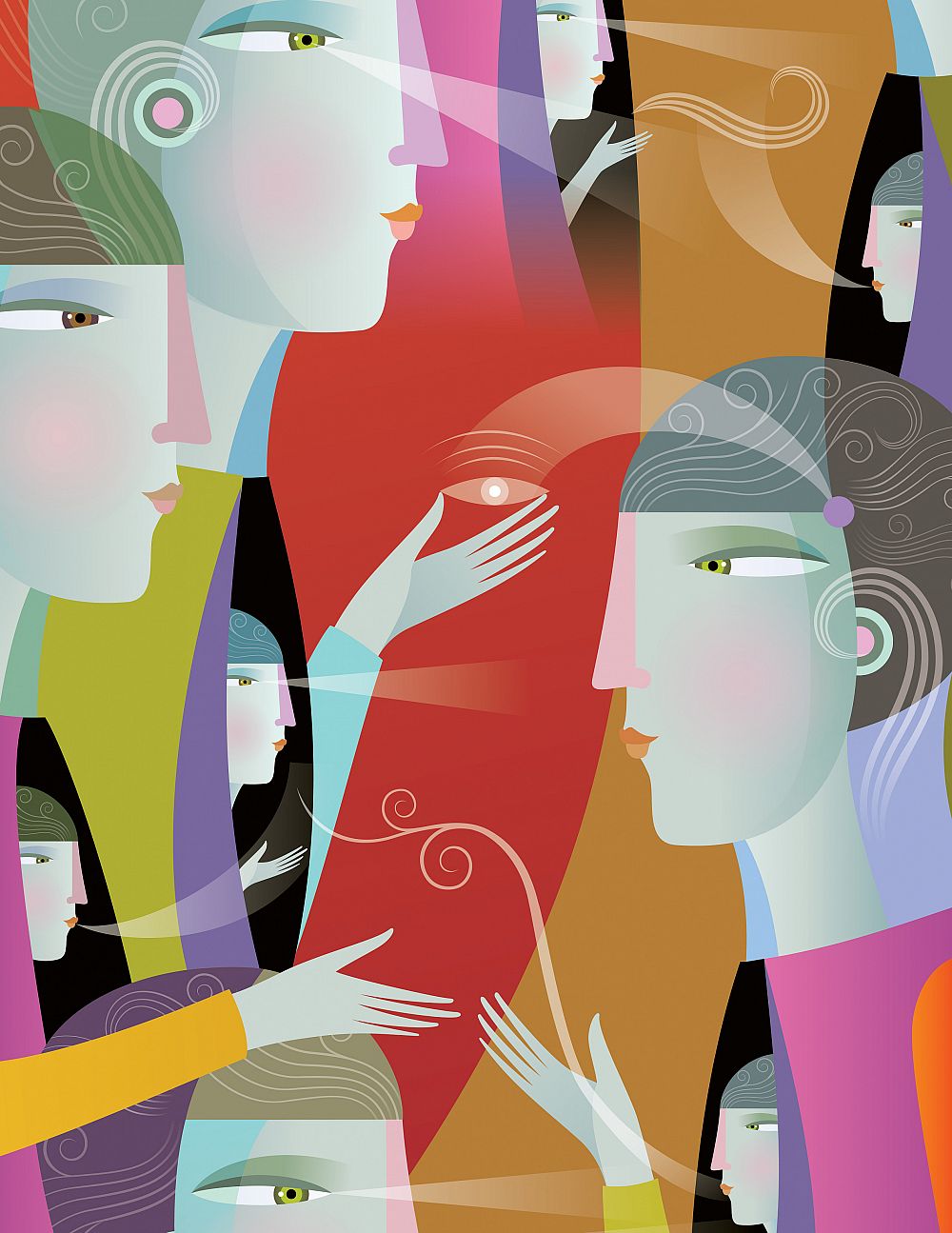main content Good Talk
Have Americans lost the ability to have civil conversations about controversial issues? Is meaningful discussion disappearing in an era of increased political polarization? Whether it’s a tense conversation over a holiday meal, a fiery exchange with a stranger on social media, or a heated political argument with a neighbor, many people in today’s world are adamant about their opinions and disinclined to listen to other viewpoints.

By Hanna Merzbach BA ’20 and Shelly Meyer
Illustrations by Christiane Beauregard
On college campuses across the country, disagreements often center on topics ranging from current world events to the choice of controversial guest speakers. Students are questioning whether free speech protections should apply to individuals who espouse polarizing ideas or seek to marginalize others. And many colleges and universities have seen a rise in safe spaces, trigger warnings, and disruptive protests that seek to silence visiting speakers with unwelcome views.
As a counterpoint to the rise in uncivil discourse, Lewis & Clark is taking a different approach. In January 2023, President Robin Holmes-Sullivan launched L&C’s Community Dialogues program, an ongoing multiyear initiative focused on building capacity to have constructive discussions. While the name Community Dialogue suggests an open-ended, large-group discussion, these sessions are instead highly structured, small-group discussions on a particular topic over a 90-minute period. The goal of this program is not to make decisions or change minds, but rather to make healthy, constructive dialogue part of the institution’s core identity.
“I have always experienced college campuses as a ‘fishbowl,’ or even the ‘canaries in the coal mine,’ in terms of whatever is occurring or going to occur in our society,” Holmes-Sullivan says. “What is not being appreciated is how nuanced most issues are—especially when we are talking about human interactions and expectations. Higher education should be a leader in restoring a culture of healthy democratic dialogue. Lewis & Clark is stepping up to do just that.”
A Network of Facilitators
To help make Community Dialogues a reality, Holmes-Sullivan tapped Janet Bixby, associate professor of teacher education and associate dean of L&C’s Graduate School of Education and Counseling. Bixby holds advanced degrees from Harvard University and the University of Wisconsin at Madison. Her scholarly interests include civic engagement of youth, teaching history, teaching social studies, and equitable practices.
Bixby says she’s passionate about democracy and citizens’ ability to build trust, even when they disagree. “It’s a skill that’s fundamentally important to our democracy,” she says. “And I also think it’s fundamentally important to our educational mission. We have to be able to stay in conversation and listen to each other.”

What Are Community Dialogues?
Community Dialogues are 90-minute structured conversations, often on controversial topics, for members of the Lewis & Clark community.
The goal of this presidential initiative is to make healthy, constructive dialogue part of the institution’s core identity.
- Dialogues include five to eight participants and two trained facilitators, who can be students, faculty, or staff from any of L&C’s three campuses.
- All dialogues start with introductions and communication agreements, such as no interrupting or judging others.
- Participants have the opportunity to answer three scripted open-ended questions related to the topic at hand. Each person has two minutes to speak or can skip their turn.
- After answering the three open-ended questions, participants have a chance to ask each other follow-up questions.
- Dialogues end with a time for open questions and final reflections.
To begin the process of establishing Community Dialogues at Lewis & Clark, Bixby and other campus leaders worked with Essential Partners, a Massachusetts-based consulting firm that collaborates with civic groups, schools, faith communities, colleges, and organizations “to build a culture of connection, a deeper sense of belonging, as well as mutual understanding and trust across differences of values, beliefs, and identities.” Essential Partners has worked with a number of higher education institutions, including Harvard, Brown, Rutgers, Tufts, and MIT.
Early on, Essential Partners helped train a core group of 24 faculty, staff, and students from across all three L&C campuses with the skills to facilitate meaningful conversations on challenging topics. Over time, the number of trained facilitators has grown to more than 60.
Community Dialogues creates space, both inside and outside the classroom, for students, faculty, and staff to engage with each other on a range of pressing topics. Ideally, participants are practicing dialogue and building their capacity to listen, speak, and learn with each other about topics central to the community’s collective well-being, even when those topics are contentious.
Bixby and her cross-institutional steering committee work with Lewis & Clark groups, offices, and departments to develop the subject matter for Community Dialogues. “I don’t sit in my office and create things and roll them out for the community,” Bixby says. “Rather, I work in conjunction with the specific campus entities interested in employing the process.”
So far, Community Dialogues have been organized around a variety of topics, including the concept of belonging, the institution’s Pioneer mascot, gender, and race and identity.
The Community Dialogues model can also be deployed in classes or symposia. For example, this spring, students in a 200-level course called Environmental Engagement, taught by Professor of Environmental Studies Jim Proctor, worked to design and host dialogues on the value and future of public forests. Participants explored questions such as “What role do trees and forests have in your life?” and “What do you value when it comes to public spaces like forests?”
The goal of open-ended questions like these, according to Bixby, is to lean into complexity. “It’s a way to explore your personal experiences, your values, your beliefs, and perspectives … all of the things that are rooted in who you are,” she explains.
Bixby says she’s eager to continue working with community groups to engage in these complicated topics. “Bring us your ideas,” she says. “We want to work with as many people as possible in getting the community to lean into genuine curiosity.”
Reflection Meets Structure
Community Dialogues can be thought of as “reflective structured dialogues.” In other words, they are facilitated conversations that are carefully structured to provide opportunities for people to talk about their experiences, listen deeply to what others have to say, and ask questions out of genuine curiosity. They are not spaces for debate or argument. (For an overview of the process, see the related article at left.)
Ginger Moshofsky BA ’83, senior associate director of alumni and parent engagement, is one of Lewis & Clark’s trained facilitators. She has hosted both in-person and Zoom-based Community Dialogues. According to Moshofsky, the goal of the dialogues isn’t to persuade people or to convert them to a particular point of view; rather, it’s for participants to share their unique perspectives.
In some situations, Moshofsky says, the facilitator may need to refocus the group. “There may come a time when a facilitator would need to say, ‘I need you to put a pin in that for a moment,’ or ‘I need to remind you of our agreement that we’re going to speak from our own experience,’ ” Moshofsky says. But typically, she adds, participants are pretty good at staying on track.
After facilitating a dialogue on the L&C mascot, Moshofsky recalls a participant saying they went into the session feeling one way on the topic and left feeling completely differently. The real magic, she says, can often come after the structured conversation.
“The Community Dialogue is a jumping-off point,” she says. “Later, if people choose to go and get a coffee in the Trail Room and say, ‘Hey, you mentioned something, and I’m curious about that’ or ‘I’d like to continue talking about that’—that’s great.”
Moshofsky adds that learning how to facilitate these conversations has helped her feel more comfortable in her own interactions.
“I sometimes find it difficult to engage with people who have different opinions from me. I can get intimidated or frustrated,” she says. “So having tools in my toolbox that I can use in those situations—whether in the Community Dialogue or just out in the world in my life—is really helpful.”

‘Equity of Voices’
Alister Ng BA ’27, a trained student facilitator, puts an emphasis on bringing people into a space of curiosity and understanding. A biochemistry major, she says one of her passions is creating community.
“I really like the idea of Community Dialogues because it creates focused, intentional dialogue rather than just dialogue to win the argument or to convert other people to certain morals,” she says.
According to Ng, dialogue participants have found it to be an eye-opening experience, learning how to understand different opinions rather than shutting down. And she says it’s helped her peers feel empowered.
“They have a place to express their frustrations or sentiments about difficult topics, without feeling the power dynamic of speaking to faculty or alums who have years of life experience ahead of us,” Ng notes. (She emphasizes that participants don’t publicly share their relationship to the college as faculty, students, or alums—just their names and pronouns.)
“When you don’t bring the power dimension into the conversation, the equity of voices becomes a lot easier to facilitate because everyone has had equal time to speak,” Ng says.
The dialogues have also proved to be a rewarding experience for alumni, as they offer an opportunity to remain engaged with topics bubbling up within the Lewis & Clark community. Over the last year, about 50 percent of participants have been alums, including Marjorie Bell BA ’03.
Bell participated in one of the dialogues about the L&C mascot, saying she wanted to learn about the different meanings that alumni associate with being a Pioneer, or “Pio.”
“I really appreciated the opportunity to hear my group’s many different responses and to think about how their experiences broadened my own understanding of what it means to be a Pio,” Bell says. “The Community Dialogue structure allowed members of my group to be in the moment, getting time and space to ponder and share individual reflections on a mutual experience.”
An Identity Built on Healthy Dialogue
President Holmes-Sullivan, a psychologist by training with a deep understanding of human interaction, is enthusiastic about the long-term promise of Community Dialogues. In fact, she characterizes it as one of the signature initiatives of her presidency.
“I want the concept of healthy dialogue to become a part of our identity as an institution and the foundation of the way we relate to each other,” she says. “Engaging in constructive dialogue is a skill that is increasingly in short supply, and one that both our students and our world desperately need.”
More L&C Magazine Stories
L&C Magazine is located in McAfee on the Undergraduate Campus.
MSC: 19
email magazine@lclark.edu
voice 503-768-7970
fax 503-768-7969
The L&C Magazine staff welcomes letters and emails from readers about topics covered in the magazine. Correspondence must include your name and location and may be edited.
L&C Magazine
Lewis & Clark
615 S. Palatine Hill Road
Portland OR 97219

